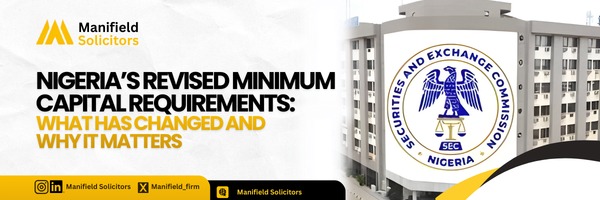In a landmark legislative update, President Bola Tinubu signed the Investments and Securities Act 2025 (“ISA” or the “Act”) into law. The Act repeals the Investments and Securities Act 2007 and reaffirms the Securities and Exchange Commission (“SEC” or the “Commission”) as the sole regulator of the Nigerian capital market. The new legislation was driven by the need to align Nigeria’s capital market with global standards and reflect the changing investment landscape, including the evolvement of digital assets over the years, and other financial investment technologies. For corporate entities, startups, financial market participants, and investors, the ISA 2025 presents a new compliance terrain and strategic opportunities. This newsletter examines the key changes under the Act and the impact of the amendments on the Nigerian economy:
- Enhanced Regulatory Oversight for the Securities and Exchange Commission (SEC):The ISA 2025 significantly expands the regulatory authority of the Securities and Exchange Commission (SEC) over capital market operators, including digital asset service providers and imposes strident sanctions on operators engaging in unethical practices.[i] The Act aligns Nigeria’s capital market regulations with international best practices and standards. A notable innovation is the expanded authority of SEC over the governance of public companies.[ii] The Commission is now empowered to appoint independent directors into the boards of public companies in which the Commission has intervened or taken a regulatory action.[iii] In addition, SEC may place directors on probation for a period deemed reasonable in accordance with regulations made under the Act.
- Regulatory Recognition of Virtual Assets as Securities: Perhaps the most significant change introduced by the ISA 2025 is the expansion of the definition of “securities” under the Interpretation section of the Act. Virtual and digital assets are now explicitly recognized as securities under the Investment and Securities Act.[iv] Previously, securities simply related to bonds, stock, debentures, shares, and similar traditional products. Now, “securities” is defined to include virtual and digital assets, and investment contracts, and where applicable, trading in the said assets, including crypto currency, Non-Fungible Tokens (NFTs), and digital currencies, will now be subject to the SEC’s regulatory purview. The inclusion of digital assets in the new legislation is a response to the ever-evolving global securities landscape and a forward-thinking approach by the regulators to ensure the country’s financial regulations remain relevant and competitive in an increasingly interconnected world.
- Classification of Securities Exchanges: The Act introduces a broad categorization of security exchanged for ease of registration and operation. Securities exchanges are now categorized into Composite and Non-Composite Exchanges.[v] A composite exchange allows the listing and trading of all categories of securities and products. Non-composite securities exchange may be registered as either a mono exchange, focused on a specific type of security or product or an alternative trading system that facilitates orders from buyers and sellers, physically or online. This classification ensures better market segmentation, encouraging specialization and improved regulatory oversight, making it easier for investors and companies to navigate the market.
- Power to Obtain Phone and Internet Data: Pursuant to the ISA 2025, the Securities and Exchange Commission (SEC) is empowered to request and obtain records of individuals or entities suspected of violating the provisions of the Act. This authority extends to accessing data held by internet service providers, telecommunications operators, and other electronic communication service providers within Nigeria. In exercising these powers, the SEC may obtain subscriber information, including personal data, payment records, and the content of communication, where relevant to an investigation or enforcement action under the Act or any applicable securities law. This signifiesa substantial enhancement of the Commission’s investigative and enforcement capabilities.[vi]
- Increased Transparency through Prohibition of Cash Transactions: The ISA 2025 introduces a complete ban on cash transactions in the Nigerian capital market. This marks a significant shift from the repealed ISA 2007, which permitted cash transactions subject to limits set by the Securities and Exchange Commission (SEC) from time to time. This amendment aims to strengthen anti-money laundering (AML) and counter-terrorism financing (CFT) objectives by ensuring traceable digital transaction flows. Market operators must now implement robust cashless protocols, reinforcing transparency and regulatory compliance.[vii]
- Sanctions against Ponzi and Unauthorized Investment Schemes:The Act explicitly prohibits Ponzi schemes, unauthorized and unregistered investment platforms to safeguard the public from unscrupulous operators and protect investors from potential losses. Under the repealed ISA 2007, enforcement efforts against such schemes were hampered by the absence of a clear statutory basis for classifying them as illegal activities. Under the ISA 2025, SEC is now empowered to prevent and sanction such illegal schemes.[viii] This legislative stance is particularly impactful given the prevalence of social-media-based Ponzi schemes in Nigeria. Promoters and operators of any entity engaged in a prohibited scheme commit an offence and are liable, on conviction, to a penalty of not less than ₦20 million or imprisonment for a term of 10 years, or both.[ix]
- Inclusion of a Regulatory Framework for Financial Market Infrastructure: The ISA 2025 has established a framework for the regulation of Financial Market Infrastructure which includes entities set up to carry out centralised multilateral clearing, settlement, caching or recording activities; or provide a platform for trading securities.[x] The provisions of the ISA 2025 on these entities are however in broad, general terms, allowing them to maintain their SRO (self-regulatory organisation) status by continuing to issue rules, subject to the approval of the SEC.
- Mandatory Legal Entity Identifier (LEI): The act requires that all entities participating in securities transactions obtain and use a legal entity identifier (LEI). This globally recognised code enhances transparency, improves systemic-risk monitoring, and supports data accuracy across the capital market.[xi]
- Mergers, Takeovers, and Corporate Restructuring Oversight: Public companies must now obtain prior SEC approval for major corporate actions including mergers, takeovers, reconstructions, and spin-offs.[xii] Additionally, SEC is also empowered to oversee compromises, arrangements, and schemes involving the amalgamation of listed companies to ensure transparency and equitable treatment of all shareholders through full disclosures.
- Unclaimed Dividends of Public Companies: The Act provides clear guidance on the treatment of unclaimed dividends of public companies under the regulatory oversight of the SEC. It mandates that such dividends must be managed strictly in accordance with the Rules and Regulations issued pursuant to the Act.[xiii] It also expressly prohibits any person or entity from dealing with unclaimed dividends in a manner that is inconsistent with the prescribed regulatory framework.
- Enhanced Access of State Governments and Their Agencies to Raise Funds Through the Market: Section 268 – 269 of the ISA 2025 applies to the Federal, State, and Local Government organizations and their owned businesses, empowering these bodies with the ability to raise money directly from the capital market through the issuing of public debt securities such as bonds, promissory notes, and non-interest financial instruments. The ISA 2025 goes further to set clear criteria which these bodies must meet before they can issue debt securities. Such criterion include; maintaining a minimum level of internally generated revenue and adhering to specified debt sustainability ratios. By subsection 7 of section 269 of the ISA 2025, “the proceeds of securities issued under this Part shall be utilized solely for the purpose for which the securities were issued.” This restriction promotes transparency and accountability in public borrowing, aligning funding with specific developmental objectives.
- Strengthened Enforcement & Whistleblower Protections: The ISA 2025 introduces a whistleblowing framework aimed at promoting accountability and transparency in Nigeria’s capital market. The Act protects employees from reprisals, such as dismissal, suspension, or any form of detriment.[xiv] These sections also void agreements that prevent such reporting and allow employees to seek remedies, including reinstatement or payment of twice their lost remuneration, through arbitration or court, which may order remedies such as reinstatement or compensation. Offending employers face penalties starting from ₦10 million, in addition to compensation obligations.
Impact on the Nigerian Economy
- The enactment of the ISA 2025 marks a significant advancement in strengthening investor’s protection, enhancing market transparency and fostering sustainable growth. The Act plays a pivotal role in shaping the direction of Nigeria’s capital markets and enhances economic sustainability;
- Investors may benefit from stronger enforcement tools, clearer disclosures, and expanded market access. For instance, the Act criminalizes Ponzi schemes and other unlawful investment practices, imposing severe penalties on violators; an action that may enhance Nigeria’s reputation as a stable and transparent market in the eyes of international investors.
- Issuers and Operators gain more structured fundraising pathways, including recognition of digital asset products.
- The broader economy may see improved market liquidity, deeper participation, and increased innovation in product design and public infrastructure financing.
- The legal recognition of crowdfunding and private placement allows small businesses to raise funds without depending on banks.
Conclusion
The ISA 2025 addresses the gaps in the former regulatory regime and aligns Nigeria’s capital market with global best practices. With innovations such as the regulation of digital assets and commodity exchanges, and the expansion of the supervisory powers for the SEC, the ISA 2025 aims to strengthen the integrity, transparency, and efficiency of Nigeria’s financial markets. The Act is expected to enhance investor confidence, attract domestic and foreign investments, improve market efficiency and promote a fair and transparent capital market. Businesses, investors and capital market operators are encouraged to familiarize themselves with these new provisions and ensure compliance.
[i] Sections 3 of Investment and Securities Act (ISA) 2025
[ii] Section 3(4) of ISA 2025
[iii] Section 3(4)(b) of ISA 2025
[iv] Section 357 of ISA 2025
[v] Section 27(1) of ISA
[vi] Section 3(4)(j) of ISA
[vii] Section 121 of ISA
[viii] Section 3(3)(r) of ISA
[ix] Section 196(3) of ISA
[x] Section 357 of ISA
[xi] Section 123 of ISA
[xii] Section 140 of ISA
[xiii] Section 93 of ISA
[xiv] Section 139(6) of ISA







Add your first comment to this post